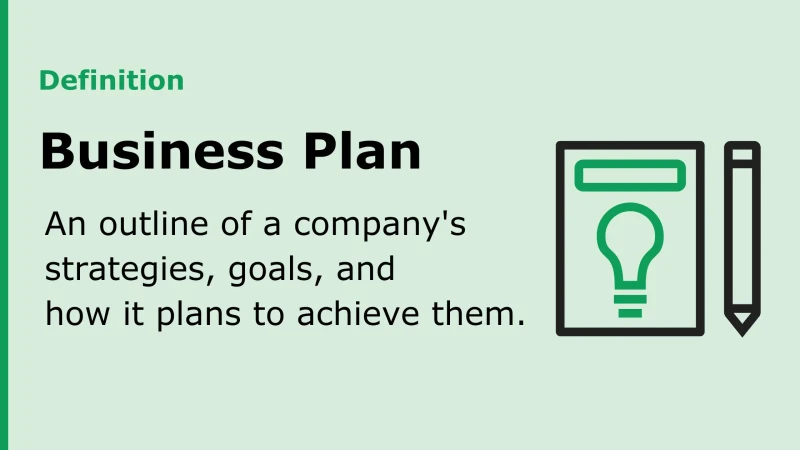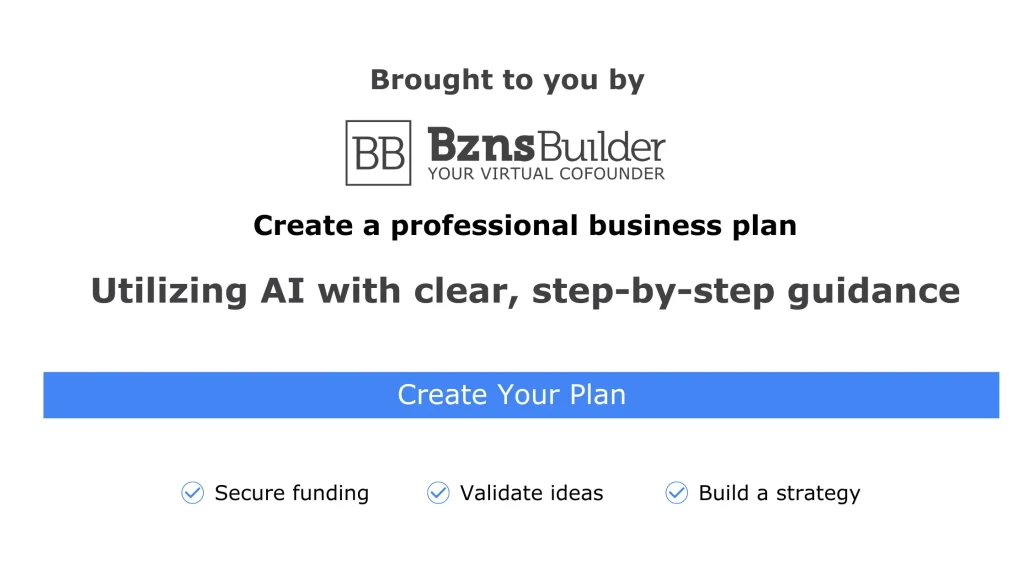What Is a Business Plan? Meaning and Helpful Resources

Have you ever scribbled a business idea on a napkin, alongside a list of tasks to get started? Believe it or not, you’ve created the foundation of a business plan—even if it’s the bare essentials.
The concept of formal planning dates back centuries, and for good reason. With 20% of new businesses failing within the first year and half not making it past the five-year mark, careful planning and thorough research are essential for success.
But what exactly is a business plan? And how do you transform initial ideas into a structured, actionable strategy? In this post, we’ll break down the elements of a plan and why creating one is key to building a successful business.
What is a business plan?
A business plan is more than just a document; it’s a strategic roadmap for turning a vision into a thriving business.
For any entrepreneur with a promising idea, the journey begins with critical steps: conducting market research, analyzing competitors, validating the concept with potential customers, and defining a unique value proposition.
Your plan captures this opportunity in detail, outlining your product or service, business model, and target market. It also provides a blueprint for execution, covering key aspects like pricing strategies, marketing plans, and financial projections.
Why Write a Plan?
The Power of Planning with BznsBuilder
If you’re wondering, “Do I really need a business plan?” consider this: businesses that invest in planning grow 30% faster than those that don’t.
Creating a plan is essential, no matter your business’s size or stage. It not only helps you build a strong foundation but also steers you away from potential pitfalls that could hinder your growth before you even start.
If you’re seeking funding—whether through a traditional bank loan, an SBA loan, or venture capital—your plan is a critical piece of the process. While venture capital firms may not always require a full plan, the strategic thinking it entails is crucial to crafting a compelling pitch that attracts investors.
Beyond funding, your plan serves as a roadmap to spot and tackle potential risks, keeping you aligned with your vision and goals. And remember, it’s not a one-time document; a business plan is a dynamic guide to ensure your business stays on track.
The Research-Backed Benefits of Planning with BznsBuilder
Research consistently shows that planning has a powerful impact on performance and growth:
- 71% of fast-growing companies have business plans that include budgets, sales targets, and defined marketing and sales strategies.
- Defining a clear value proposition directly correlates with increased business success.
- Startups and businesses with a formal plan are more likely to secure funding than those without one.
- Beginning the planning process before investing in marketing significantly reduces the risk of business failure.
Whether you’re a startup or an established company, the planning process plays a crucial role in driving growth and building a resilient foundation for success.
When to Write a Business Plan: Timing Tips from BznsBuilder
Every business plan is unique, but one common question entrepreneurs face is when to start drafting it.
A Harvard Business Review study suggests that the best time to write a business plan is within 6 to 12 months after deciding to start a business. However, the timing can vary based on your business stage and the specific type of plan you’re crafting.
Key moments to write a business plan include:
- When you first have a business idea
- When you’re launching a new venture
- When preparing to buy or sell a business
- When seeking funding or investment
- When adapting to changes in the business environment
- When you’re ready to grow or scale your business
Writing a plan during these crucial stages helps create a solid roadmap, guiding you through each phase of your journey.
How Often Should You Update Your Business Plan? Insights from BznsBuilder
Updating your plan depends on where you are in your business journey. It’s not a one-time task to complete and shelve but an active tool for tracking growth, addressing challenges, and seizing new opportunities.
Your plan should evolve to reflect new insights, changing market conditions, and valuable feedback from customers. It’s a dynamic document, not a static one.
For entrepreneurs in the ideation stage, revisiting the business plan regularly helps assess if their idea has the potential to become profitable. For established business owners, updating the plan allows for swift responses to market shifts, aligning projections with real financial results, and identifying areas where performance is either exceeding or falling short of expectations.
In short, a proactive planning process uncovers the insights needed for ongoing business success.
How Long Should Your Business Plan Be? Tips from BznsBuilder
Focusing solely on page length can miss the mark; what matters most is the clarity and detail your plan provides.
A comprehensive plan includes not just text but also financial tables, charts, and product illustrations. Here are some general guidelines for determining your plan’s length:
- Quick readability: Your plan should be skimmable in about 15 minutes.
- Internal plans: If the plan is for internal purposes, it can be as brief as 5 to 10 pages.
- Audience expectations: Tailor the length to your audience. For a bank loan, a detailed, formal plan is best. For internal stakeholders, a shorter, more concise version (even just a few pages) may be more effective.
The length can also vary based on your business’s stage. For example, a startup plan may need less financial detail than a plan for an established company.
The goal is to create a plan that fits the needs of your business and communicates effectively to your intended audience.
What to Include in a Plan: Essential Elements from BznsBuilder
Types of Business Plans: Finding the Right Fit with BznsBuilder
A business plan isn’t one-size-fits-all; it should be tailored to meet the needs of entrepreneurs or established business owners. Here are a few common types of plans for small businesses:
- One-Page Plan: A concise, adaptable plan that captures the most essential information about a business on a single page.
- Growth Plan: A dynamic business management plan that aligns strategies and tactics as the business scales.
- Internal Plan: A streamlined version of a full plan, designed for internal stakeholders—perfect for established companies evaluating strategic changes.
Each type serves a unique purpose, allowing businesses to plan effectively for various goals and audiences.
Business Plan vs. Operational Plan vs. Strategic Plan: Understanding the Differences with BznsBuilder
What are the key questions you need to answer? Are you outlining a roadmap for daily business operations or focusing on achieving long-term goals? Clarifying your objective will help guide the type of plan you need.
While a plan forms the core foundation, other plans provide targeted support:
- Business Plan: Establishes the overarching framework and vision for the business, defining its purpose, offerings, and target market.
- Operational Plan: Focuses on short-term objectives, detailing where resources and efforts will be directed to reach immediate milestones.
- Strategic Plan: Looks at long-term growth, identifying opportunities and setting larger goals to drive sustained success over time.
Each plan serves a distinct purpose, aligning your strategy with both immediate and future goals.
Business Plan vs. Business Model: Key Differences for Entrepreneurs with BznsBuilder
From Idea to Plan: Your First Steps with BznsBuilder









